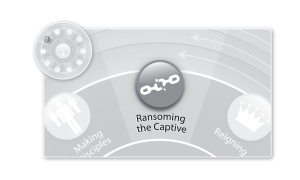Part III of our series on Ransoming the Captive
As is the practice of those who would be a disciple of Jesus, learning how to ransom captives involves us first looking at how God ransomed us.
First we hear the word of how God has ransomed us. Then, we do the word.
So we began with Jesus’ first sermon, where he talked about ransoming the captives. And here is the key point I want to make over these last few blog posts:
As Jesus’ mission unfolded, what Scripture reveals is that Jesus did not come to pay the ransom, but rather to be, personally, the ransom for all people.
The apostle Paul summarizes it in this way:
For there is one God and one mediator between God and men, the man Christ Jesus, who gave himself as a ransom for all men—the testimony given in its proper time.
(1 Timothy 2:5–6)
Mark Shea writes about Francis Gajowniczek, a Polish army sergeant who was sent to a Nazi concentration camp during World War II for aiding Jewish people. One day in the camp, something remarkable happened to him. Shea writes,
Gajowniczek was chosen at random by the commandant of Auschwitz to die along with several other prisoners in reprisal for an escape. His sentence was to perish in the starvation bunker without food or water in the middle of the blistering Polish summer of 1941. As he was about to be led away, [he said, “”My poor wife! My poor children! What will they do?”]… there was a stir in the ranks of the assembled prisoners in the yard.
A man stepped forward and volunteered to take Gajowniczek’s place. He explained that he was old and a priest, of no use to anyone in the Nazi New Order of utility. The commandant, with brutal Nazi calculation, accepted the proposal—and St. Maximilian Kolbe was led away as a ransom just as his Master had been.
Just as his Master had been.
When we pay 50 cents a gallon of people’s gasoline cost, it reminds them that there are still nice people in the world.
But when we ransom the way Jesus ransomed – when The Ransom Church actually becomes a ransom in Christ’s name, rather than just paying for gas and wrapping paper – it reminds the world that there is a redeemer: Jesus, God’s own Son, the perfect…and only…ransom for our sins.
And through the Holy Spirit, we are invited as his church to return to the literal work of ransoming that he began.
When thinking about becoming a ransom for someone else in Jesus’ name, what fears or reservations do you have?












Pingback: When God Leads Into Captivity | Rev. Eric Foley
I don’t see your reasoning or proof concerning what you call MYTH.
dennis caeton
Good to hear from you, Dennis. Thanks for your comment. The purpose of the post is to point out that Christians will sometimes say that Jesus came to “pay” the ransom for sin; however, scripture says that Jesus was himself the ransom. So when I use the word “myth” here, I am using it to refer to something that is untrue. The truth, as Jesus shares in Matthew 20:28, is that he gave himself as a ransom, not that he paid a ransom. Hope that helps.